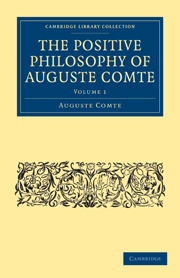CHAPTER VI - INTELLECTUAL AND MORAL OR CEREBRAL FUNCTIONS
Published online by Cambridge University Press: 29 August 2010
Summary
The remaining portion of biological philosophy is that which relates to the study of the affective and intellectual faculties, which leads us over from individual physiology to Social Physics, as vegetative physiology does from the inorganic to the organic philosophy.
Shortcoming of Descartes
While Descartes was rendering to the world the glorious service of instituting a complete system of positive philosophy, the reformer, with all his bold energy, was unable to raise himself so far above his age as to give its complete logical extension to his own theory by comprehending in it the part of physiology that relates to intellectual and moral phenomena. After having instituted a vast mechanical hypothesis upon the fundamental theory of the most simple and universal phenomena, he extended in succession the same philosophical spirit to the different elementary notions relating to the inorganic world; and finally subordinated to it the study of the chief physical functions of the animal organism. But, when he arrived at the functions of the affections and the intellect, he stopped abruptly, and expressly constituted from them a special study, as an appurtenance of the metaphysico-theological philosophy, to which he thus endeavoured to give a kind of new life, after having wrought far more successfully in sapping its scientific foundations. We have an unquestionable evidence of the state of his mind in his celebrated paradox about the intelligence and instincts of animals.
- Type
- Chapter
- Information
- The Positive Philosophy of Auguste Comte , pp. 458 - 480Publisher: Cambridge University PressPrint publication year: 2009First published in: 1853



